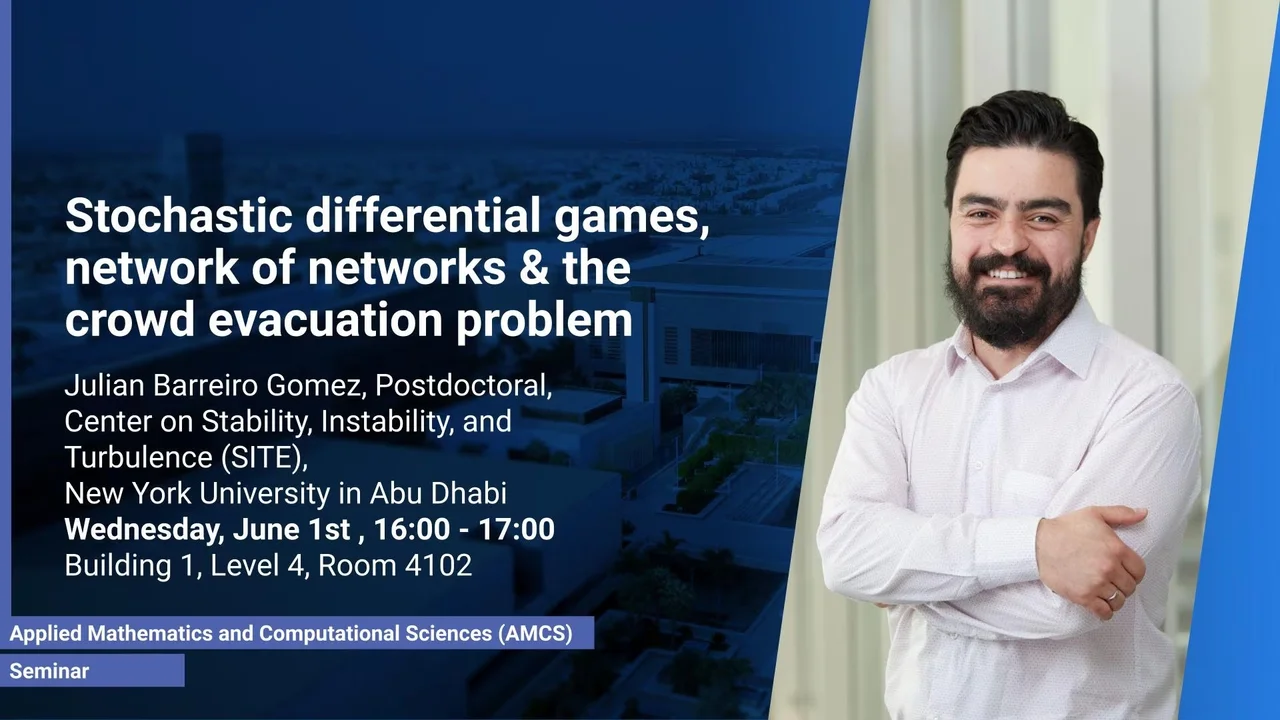
Stochastic differential games, network of networks and the crowd evacuation problem
- Dr. Julian Barreiro Gomez, Center on Stability, Instability, and Turbulence (SITE) at the New York University in Abu Dhabi
B1 L4 R4102
In this talk, we present a class of stochastic differential games that can incorporate the distribution of the variables of interest (e.g., the system states and/or decision-makers' actions) into the strategic-interaction problem. We motivate the use of this type of differential games in networked large-scale applications that cover a high variety of engineering systems. In particular, we focus on the crowd evacuation problem. First, we only consider local aggregated congestion terms that penalize the magnitude of the decision-makers’ strategies allowing us to avoid the formation of congestion. Second, we consider both local and global aggregated congestion terms to perform crowd aversion during the evacuation procedure. We present some numerical results and few future directions, e.g., the case where decision-makers do not have prior knowledge about the geometry of the structure to be evacuated neither the existing obstacles.
Overview
Abstract
In this talk, we present a class of stochastic differential games that can incorporate the distribution of the variables of interest (e.g., the system states and/or decision-makers' actions) into the strategic-interaction problem. We motivate the use of this type of differential games in networked large-scale applications that cover a high variety of engineering systems. In particular, we focus on the crowd evacuation problem. First, we only consider local aggregated congestion terms that penalize the magnitude of the decision-makers’ strategies allowing us to avoid the formation of congestion. Second, we consider both local and global aggregated congestion terms to perform crowd aversion during the evacuation procedure. We present some numerical results and few future directions, e.g., the case where decision-makers do not have prior knowledge about the geometry of the structure to be evacuated neither the existing obstacles.
Brief Biography
Julian Barreiro-Gomez received his MSc. degree in Electrical Engineering and the Ph.D. degree in Engineering from Universidad de Los Andes (UAndes), Bogota, Colombia, in 2013 and 2017, respectively. He received the Ph.D. degree (cum laude) in Automatic, Robotics and Computer Vision from the Technical University of Catalonia (UPC), Barcelona, Spain, in 2017, the Best Ph.D. Thesis in Control Engineering 2017 award from the Spanish National Committee of Automatic Control (CEA) and Springer, and the Best Ph.D. Thesis in Europe in the Field of Control for Complex and Heterogeneous Systems 2017 awarded by the European Embedded Control Institute (EECI). Since 2018, he is a Senior Member of the IEEE. He is co-author of the book “mean-field-type games for engineers” published by CRC Press. He is currently a Postdoctoral Associate in the Center on Stability, Instability, and Turbulence (SITE) at the New York University in Abu Dhabi (NYUAD), United Arab Emirates. Before joining SITE, he was with the Learning & Game Theory Laboratory (L&G-Lab) at the same university. His main research interests are: Optimal Control, Dynamic Games, Machine Learning, and Engineering Applications